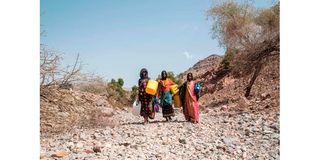Happening Now: Trump takes the lead in US presidential race
Sexual violence still rampant in Tigray despite peace deal

Internally displaced women who are sheltered in a makeshift camp in Erebti, Ethiopia. Human rights organisations have raised concerns over continued sexual violence after cessation of hostilities deal.
What you need to know:
- The Physicians for Human Rights and the Organisation for Justice and Accountability in the Horn of Africa say most victims are women and girls.
- Of the cases, 21 involved children aged between eight and 17.
Human rights groups have lifted the lid off sexual violence against girls and women in Tigray, Ethiopia, despite cessation of hostilities.
Some 304 randomly selected medical records from multiple health facilities in the region reveal widespread and systematic conflict-related sexual violence perpetrated from the beginning of the conflict in November 2020 through June 2023. The survivors are aged between eight and 69.
The Physicians for Human Rights (PHR) and the Organisation for Justice and Accountability in the Horn of Africa (OJAH) say most victims are women and girls. Of all the cases, 21 involved children aged between eight and 17.
The brutal patterns of conflict-related sexual violence against minors were similar to those experienced by adults, including rape by multiple perpetrators (57 per cent), sexual slavery (5.0 per cent), and beatings (5.0 per cent).
Ninety-five per cent of cases involving those aged below 18 occurred following the signing of the agreement in November last year.
In 76 per cent of the cases, sexual violence was carried out by multiple perpetrators rather than a single individual, suggesting an organised tactic. About 10 medical records report captivity during rape by multiple perpetrators, consistent with enslavement and sexual slavery.
Also read: Widespread rape in Tigray, Amnesty says
“The ongoing, widespread conflict-related sexual violence we’ve documented in Tigray shows the urgent need for aid, medical care, and reparations to the survivors. These brutal violations of international law also demand greater efforts at accountability from the United Nations and the African Union, despite the Ethiopian government’s efforts to block independent monitoring and justice,” said Sam Zarifi, PHR’s executive director.
The medical records depict serious physical and psychological consequences, both short- and long-term, such as post-traumatic stress disorder (13 per cent), depression (17 per cent), and reproductive organ injuries and disorders (11 per cent), including urinary incontinence, faecal incontinence, abnormal uterine bleeding, uterine prolapse, chronic pelvic pain, and fistulas.
Records show that in multiple instances, conflict-related sexual violence may have resulted in pregnancy, with 27 per cent of patients tested for pregnancy at the time of examination being positive or having contracted HIV. About 11 per cent of patients tested for HIV were positive.
“Hundreds of de-identified medical records from health facilities in Tigray uncover profound human suffering and harm, corroborating other reports of rape and other forms of sexual violence, and suggesting that sexual violence is being deployed as a tactic of war,” said Ranit Mishori, senior medical adviser at PHR and professor of family medicine at the Georgetown University School of Medicine.
Dr Mishori said the scientific evidence found cannot be ignored or refuted. “These violations have caused survivors significant harm, leading to an urgent need for medical and psychosocial support.
“We honour the strength and resilience of the survivors whose experiences are reflected in this data, and commend the bravery of the Ethiopian clinicians who provide lifesaving care and document atrocities in the face of targeted attacks.”
Weapon of war
The director of OJAH noted that the pattern and perpetrator profiles indicate that the incidents were widespread and systematic.
“The results of this inquiry align with existing reports from international human rights organisations, underscoring the use of sexual violence as a weapon of war against civilian populations in Tigray. What is even more concerning is that these atrocities continue to be perpetrated in certain areas of the Tigray region, months after the cessation of hostilities agreement,” he said.
The United Nations, human rights organisations, academics, and journalists have documented widespread civilian suffering, displacement, famine, violence, and other human rights violations, including conflict-related sexual violence, since the conflict between the government of Ethiopia and the Tigray People’s Liberation Front began in November 2020.
About 600,000 civilians have died in Tigray, either by direct violence and killings or indirect violence through starvation, or lack of healthcare.





